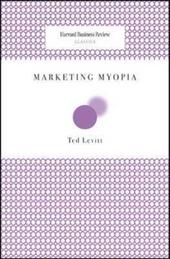
|
Marketing Myopia
Paperback / softback
Main Details
| Title |
Marketing Myopia
|
| Authors and Contributors |
By (author) Theordore Levitt
|
| Series | Harvard Business Review Classics |
|---|
| Physical Properties |
| Format:Paperback / softback | | Pages:104 | | Dimensions(mm): Height 165,Width 106 |
|
| Category/Genre | Sales and marketing |
|---|
| ISBN/Barcode |
9781422126011
|
| Classifications | Dewey:658.8 |
|---|
| Audience | |
|---|
|
Publishing Details |
| Publisher |
Harvard Business Review Press
|
| Imprint |
Harvard Business Review Press
|
| Publication Date |
16 June 2008 |
| Publication Country |
United States
|
Description
At some point in its development, every industry can be considered a growth industry, based on the apparent superiority of its product. But in case after case, industries have fallen under the shadow of mismanagement. What usually gets emphasised is selling, not marketing. This is a mistake, because selling focuses on the needs of the seller, whereas marketing concentrates on the needs of the buyer. In this widely quoted and anthologised article, first published in 1960, Theodore Levitt argues that "the history of every dead and dying 'growth' industry shows a self-deceiving cycle of bountiful expansion and undetected decay." But, as he illustrates, memories are short. The railroads serve as an example of an industry whose failure to grow is due to a limited market view. Those behind the railroads are in trouble not because the need for passenger transportation has declined or even because cars, airplanes, and other modes of transport have filled that need. Rather, the industry is failing because those behind it assumed they were in the railroad business rather than the transportation business. They were railroad oriented instead of transportation oriented, product oriented instead of customer oriented. For companies to ensure continued evolution, they must define their industries broadly to take advantage of growth opportunities. They must ascertain and act on their customers' needs and desires, not bank on the presumed longevity of their products. In short, the best way for a firm to be lucky is to make its own luck. An organisation must learn to think of itself not as producing goods or services but as doing the things that will make people want to do business with it. And in every case, the chief executive is responsible for creating an environment that reflects this mission.
Author Biography
Theodore Levitt was the Edward W. Carter Professor of Business Administration Emeritus at the Harvard Business School and former editor of the Harvard Business Review.
|